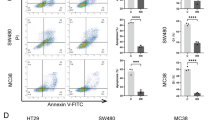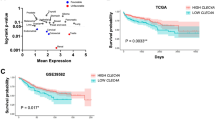Abstract
Objective: It has been proposed that Fas ligand (FasL) may play an important role in immune escape of tumors and FLIP is an important mediator of Fas/FasL pathway. In this study, the expression of FLIP was determined in human colon carcinoma cell lines and tissue to investigate the new mechanism of immune evasion of human colon carcinomas. Methods: RT-PCR and immunohistochemistry (IHC) were performed to investigate the expression of FLIP in human colon carcinoma cell lines SW480, LS174 and twenty human primary colon carcinoma specimens. Results: It was shown that SW480 cells, LS174 cells and primary colon carcinoma specimen constitutively expressed FLIP at the mRNA and protein level. The expression of FLIP was not found in the epithelial cells of normal colon mucosa. Conclusion: FLIP was expressed in human primary colon carcinoma specimens but not in the normal counterpart. It suggested that the expression of FLIP may occur during the malignant transformation from normal colon epithelial cells to colon carcinoma cells. Tumor cells might obtain the ability to resist the Fas-mediated apoptosis by expressing FLIP. The expression of FLIP might contribute to the formation of colon carcinomas.
Similar content being viewed by others
References
Itoh N, Yonehara S, Ishii A, et al. The polypeptide encoded by the cDNA for human cell surface antigen Fas can mediate apoptosis [J]. Cell 1991; 66:233–43.
Suda T, Takahashi T, Golstein P, et al. Molecular cloning and expression of the Fas ligand: a novel member of the tumor necrosis factor family [J]. Cell 1993; 75:1169–78.
Takahashi T, Tanaka M, Inazawa J, et al. Human Fas ligand: Gene structure, Chromosomal location and species specificity [J]. Int Immunol 1994; 6:1567–74.
Dhein J, Daniel PT, Trauth BC, et al. Induction of apoptosis by monoclonal antibody anti-APO-1 class switch variants is dependent on cross-linking of APO-1 cell surface antigens [J]. J Immunol 1992; 149:3166–73.
Walker PR, Saas P, Dietrich PY. Role of Fas ligand (CD95L) in immune escape: the tumor cell strikes back [J]. J Immunol 1997; 158:4521–4.
Gratas C, Tohma Y, Barnas C, et al. Up-regulation of Fas (APO-1/CD95) ligand and down-regulation of Fas expression in human esophageal cancer [J]. Cancer Res 1998; 58:2057–62.
Bennett MW, O’Connell J, O’Sullivan GC, et al. The Fas counterattack in vivo: apoptotic depletion of tumor-infiltrating lymphocytes associated with Fas ligand expression by human esophageal carcinoma [J]. J Immunol 1998; 160:5669–75.
Nagata S. Apoptosis by death factor [J]. Cell 1997; 88:355–65.
Kischkel FC, Hellbardt S, Behrmann I, et al. Cytotoxicity-dependent APO-1 (Fas/CD95)-associated proteins form a death-inducing signaling complex (DISC) with the receptor [J]. EMBO J 1995; 14:5579–88.
Medema JP, Scaffidi C, Kischkel FC, et al. FLICE is activated by association with the CD95 death-inducing signaling complex (DISC) [J]. EMBO J 1997; 16:2794–804.
Chinnaiyan AM, O’Rourker K, Tewari M, et al. FADD, a novel death domain-containing protein, interacts with the death domain of Fas and initiates apoptosis [J]. Cell 1995; 81:505–12.
Muzio M, Chinnaiyan AM, Kischkel FC, et al. FLICE, a novel FADD-homologous ICE/CED-3-like protease, is recruited to the CD95 (Fas/APO-1) death-inducing signaling complex [J]. Cell 1996; 85:817–27.
Boldin MP, Goncharov TM, Goltsev YV, et al. Involvement of MACH, a novel MORT1/FADD-interacting protease, in Fas/APO-1 an TNF receptor-induced cell death [J]. Cell 1996; 85:803–15.
Thome M, Schneider P, Hofmann K, et al. Viral FLICE-inhibitory proteins (FLIPs) prevent apoptosis induced by death receptors [J]. Nature 1997; 386:517–21.
Irmler M, Thome M, Hahne M, et al. Inhibition of death receptor signals by cellular FLIP [J]. Nature 1997; 388:190–5.
O’Connell J, O’Sullivan GC, Collins JK, et al. The Fas counterattack: Fas-mediated T cell killing by colon cancer cells expressing Fas ligand [J]. J Exp Med 1996; 184:1075–82.
Yonehara S, Ishii A, Yonehara M. A cell-killing monoclonal antibody (anti-Fas) to a cell surface antigen co-downregulated with the receptor of tumor necrosis factor [J]. J Exp Med 1989; 169:1747–56.
Trauth BC, Klas C, Peters AM, et al. Monoclonal antibody-mediated tumor regression by induction of apoptosis [J]. Science 1989; 245:301–5.
Niehans GA, Brunner T, Frizelle SP, et al. Human lung carcinomas express Fas ligand [J]. Cancer Res 1997; 57:1007–12.
Hahne M, Rimoldi D, Schröter M, et al. Melanoma cell expressin of Fas (APO-1/CD95) ligand: implications for tumor immune escape [J]. Science 1996; 274:1363–6.
Strand S, Hofmann WJ, Hug H, et al. Lymphocyte apoptosis induced by CD95 (APO-1/Fas) ligand-expressing tumor cells: A mechanism of immune evasion [J]. Nat Med 1996; 2:1361–6.
Saas P, Walker PR, Hahne M, et al. Fas ligand expression by Astrocytoma in vivo: maintaining immune privilege in the brain [J]? J Clin Invest 1997; 99:1173–8.
Shiraki K, Tsuji N, Shioda T, et al. Expression of Fas ligand in liver metastases of human colonic adenocarcinomas [J]. Proc Natl Acad Sci USA 1997; 94:6420–5.
Xing BC, Wang Y, Wimmenauer S, et al. FasL expression in human colon carcinomas [J]. Chin J Cancer Res 2002; 14:37–41.
Ungefroren H, Voss M, Jansen M, et al. Human pancreatic adenocarcinoma express Fas and Fas ligand yet are resistant to Fas-mediated apoptosis [J]. Cancer Res 1998; 58:1741–9.
Walker PR, Saas P, Dietrich PY. Tumor expression of Fas ligand (CD95L) and the consequences [J]. Curr Opin Immunol 1998; 10:564–72.
Kataoka T, Schröter M, Hahne M, et al. FLIP prevents apoptosis induced by death receptors but not by perforin/granzyme B, chemotherapeutic drugs and gamma irradiation [J]. J Immunol 1998; 161:3936–42.
Author information
Authors and Affiliations
Corresponding author
Additional information
Biography: XING Bao-cai (1963–), male, doctor of medicine, associate professor, Department of Surgical Oncology, Peking University School of Oncology, majors in surgical oncology.
Rights and permissions
About this article
Cite this article
Xing, Bc., Wimmenauer, S. & Farthmann, E. Expression of FLIP in human colon carcinomas: A new mechanism of immune evasion. Chin. J. Cancer Res. 17, 193–198 (2005). https://doi.org/10.1007/s11670-005-0039-9
Received:
Accepted:
Issue Date:
DOI: https://doi.org/10.1007/s11670-005-0039-9




